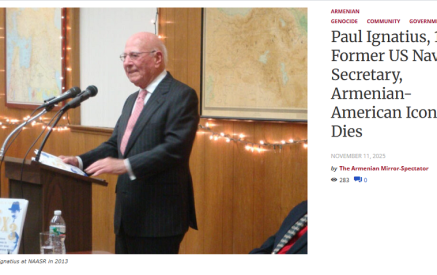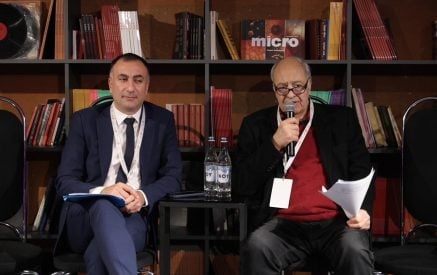Assembly Statement on Armenian Genocide Remembrance Day
Washington, D.C. – On the solemn occasion of the 109th anniversary of the Armenian Genocide, the Armenian Assembly of America honors the memory of the 1.5 million Armenians who were massacred by the Ottoman Empire’s Young Turk government during World War I. We deeply thank President Biden for institutionalizing the United States acknowledgment of the Armenian Genocide as such with annual statements including this year’s, wherein he stated: “Today, we pause to remember the lives lost during the Meds Yeghern—the Armenian genocide—and renew our pledge to never forget. The campaign of cruelty began on April 24, 1915, when Ottoman authorities arrested Armenian intellectuals and community leaders in Constantinople.”
“Today, there is chilling behavior in the form of words and actions from both the Erdogan government in Turkey and the Aliyev regime in Azerbaijan to continue genocide against indigenous Armenians, their churches and culture, and to complete and deny the crime begun in the 19th and 20th centuries now extended to the 21st,” stated Assembly Co-Chairs Anthony Barsamian and Van Krikorian.
“As we mark this solemn occasion, we also stand with the people of Artsakh, who were driven from their ancestral homeland as a result of Azerbaijan’s genocidal campaign in what former International Criminal Court prosecutor Luis Ocampo described during a Congressional hearing before the Tom Lantos Human Rights Commission as ethnic cleansing and genocide,” the Co-Chairs continued.
Painfully, the Biden Administration and too many other governments have failed to meet obligations to prevent genocide and continue to apply double standards, enabling this “Problem from Hell” to spread. Rhetorical support alone, without using tools toward prevention, only enables further crimes and grants amnesty for atrocities. This is not what Americans and people of good conscience expect from our government.
We stand with all genocide victims around the world and ask support in rejecting double standards. Beyond the obvious steps of rectifying waivers of Section 907, enforcing the Humanitarian Aid Corridor Act, (the law states that “no assistance shall be furnished under this chapter or the Arms Export Control Act to any country when it is made known to the President that the government of such country prohibits or otherwise restricts, directly or indirectly, the transport or delivery of United States humanitarian assistance”), providing military and other meaningful assistance to Armenia, stopping the destruction of centuries old churches, ensuring safe repopulation of Armenians to ancestral homes, one obvious step is to suspend US participation in COP 29, the United Nations Climate Change Conference scheduled for November of this year in Baku, so as not to irreparably damage credibility for the environment and human rights.
On September 14, 2023, a Biden Administration representative testified before the Senate Foreign Relations Committee that the US would not tolerate ethnic cleansing in Nagorno-Karabakh, and stated that “the current humanitarian situation is not acceptable. Humanitarian access through the Lachin corridor and other routes must be made available now. We have also made it abundantly clear that the use of force is not acceptable. We give this committee our assurance that these principles will continue to guide our efforts in this region.” This promise went unfulfilled and bodes ill for the future.
The Assembly pays tribute to the survivors, and descendants of survivors, who found refuge in countries around the world, including the United States, which acknowledged the Armenian Genocide in its 1951 International Court of Justice submission, President Reagan’s 1981 Proclamation, and all 50 states.
The tireless advocacy efforts of the Armenian American community led to the overwhelming passage in Congress of the Armenian Genocide Resolution in 2019, and subsequent affirmations by President Joe Biden in 2021, 2022 and 2023.
The elimination of the Armenian Christian presence in modern Turkey, in Nakhichevan during the Soviet Period, in Azerbaijan in the late 1980s and 1990s, and the Nagorno-Karabakh Republic will generate the same tireless advocacy until there is a just reconciliation, instead of the religious and ethnic hatred driven by Erdogan and Aliyev.
This week, the U.S. State Department released its Country Report on Azerbaijan’s Human Rights Practices and critiqued the country’s “significant human rights issues,” which included “credible reports of unlawful or arbitrary killing; torture and cruel, inhuman, or degrading treatment or punishment by members of the security forces; harsh and sometimes life-threatening prison conditions; arbitrary detention; and political prisoners,” among many others.
The report also noted that “the government did not take credible steps to punish the majority of officials who were reported to have committed human rights abuses. There was no reported progress on government investigations of alleged abuses committed by Azerbaijani armed forces or individuals during the 2020 and 2022 hostilities.” Yet, the State Department report itself ignored incontrovertible evidence on atrocities and genocide.
The Assembly’s recent Spring 2024 Advocacy Summit, united activists, from California to New York, to participate in over 300 meetings with their elected officials to advocate for increased aid to Armenia, protection of its sovereign borders, humanitarian assistance to the displaced Armenians of Artsakh, release of the Armenian prisoners of war and civilians, and to hold Azerbaijan’s dictatorial Aliyev regime accountable for its ethnic cleansing of Armenians. We continue to pray for, and call for, the release of hostages held by the Aliyev regime in Baku, under the guise of farcical criminal proceedings

























































